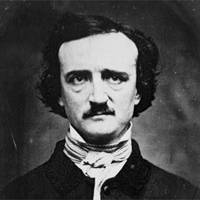
In addition to being a fine story writer and poet, Edgar Allan Poe was an important literary critic who could do much to make or break a writer's reputation. He reviewed many of the important writers of his time, like Nathaniel Hawthorne and Henry Wadsworth Longfellow. Poe wrote of Hawthorne, "High imagination gleams from every page. Mr. Hawthorne is a man of the truest genius." Poe skewered Longfellow, arguably the most popular American poet of all time, whom he accused of plagiarism.
The scholarly Poe, nowadays too often confused by readers and some teachers with the drug-depressed, psychologically unstable, characters in his horror tales, would often write philosophical mini treatises on the nature of art, the short story, the epic tale, and yes . . . even his own poetry.
Poe wrote an essay,
"The Philosophy of Composition," (click to link) which gives his step-by-step approach in the important decisions in writing "The Raven." The essay reads like a "How To . . . Essay." It's organized, well supported, a trifle arrogant, and well . . . maybe a huge lie. But that's another story.
However, even most scholars today would agree that "The Raven" is, if not an artistic masterpiece, then at least a lyrical "tour de force," a French phrase meaning "a particularly adroit maneuver or technique in handling a difficult situation." The difficult situation was of Poe's own making, the feat of weaving meter, rhyme, and sound to create a hypnotizing, melancholy, effect on the readers of "The Raven."
Your journal assignment is to be a critic of some type. Visit a restaurant, read a book, watch a movie, listen to a CD, or go to an art gallery. Then summarize what you've taken in. Tell me (or us) what you think, feeling free to add what you might have done better had you been the cook, the novelist, the director, the singer, or the artist. You may comment on someone else's reveiw as long as you maintain a friendly tone. Heck, if YOU want to be SOPOE, why not tell me (us) how you created your own artistic masterpiece, as Poe did in "The Philosophy of Composition"?
 I'll keep my comments short and to the point, because you'd probably NOT want to hear about the many red cardinals that visited my feeder on Thanksgiving Day, about the (How bout them . . . !) Dallas Cowboys making mincemeat of the Tampa Bay Buccaneers, or about the excellent quality of my roasted turkey, which I soaked in a brine solution for ten hours to make it extra juicy. The Thanksgiving Holiday has always been my favorite, because it's Christmas without the hassles--the endless carols, the mad shopping rush, and whatever it is that has transformed the religious feast into a commercial beast. I celebrated my Thanksgiving with lots of food and family, nothing unique here, I'm sure, but certainly keeping in the spirit of the holiday. What I'd really like to know is how you spent your Thanksgiving vacation, especially if it turned out to be a pretty special one. For those of you who don't care to share such personal stories, or if your vacation wasn't so good, feel "free" to write about "anything" that especially excited or interested you over the six-day break. Did you read a good book, watch a good movie, or draw or Thanksgiving turkey with a younger sibling or relative (see above photo)? Were you one of the crazies who stood in line for days to buy the new Nintendo? Let me hear it. "Thanks" for sharing.
I'll keep my comments short and to the point, because you'd probably NOT want to hear about the many red cardinals that visited my feeder on Thanksgiving Day, about the (How bout them . . . !) Dallas Cowboys making mincemeat of the Tampa Bay Buccaneers, or about the excellent quality of my roasted turkey, which I soaked in a brine solution for ten hours to make it extra juicy. The Thanksgiving Holiday has always been my favorite, because it's Christmas without the hassles--the endless carols, the mad shopping rush, and whatever it is that has transformed the religious feast into a commercial beast. I celebrated my Thanksgiving with lots of food and family, nothing unique here, I'm sure, but certainly keeping in the spirit of the holiday. What I'd really like to know is how you spent your Thanksgiving vacation, especially if it turned out to be a pretty special one. For those of you who don't care to share such personal stories, or if your vacation wasn't so good, feel "free" to write about "anything" that especially excited or interested you over the six-day break. Did you read a good book, watch a good movie, or draw or Thanksgiving turkey with a younger sibling or relative (see above photo)? Were you one of the crazies who stood in line for days to buy the new Nintendo? Let me hear it. "Thanks" for sharing.

